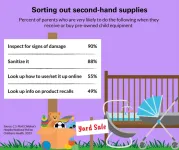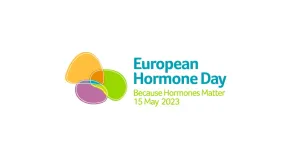(Press-News.org) Statement Highlights:
In a review of the latest research, few stroke studies addressed racist policies, such as residential segregation, or social determinants of health, such as neighborhood deprivation, walkability or security; food availability; economic stability; education quality; or employment and health insurance, all of which play a role in stroke incidence, care and outcomes.
The statement summarizes research on interventions to address racial and ethnic disparities in stroke care and outcomes.
Additional research is needed to determine which types of structural or “upstream” interventions may help to reduce inequities in stroke care.
Embargoed until 4 a.m. CT/5 a.m. ET, Monday, May 15, 2023
DALLAS, May 15, 2023 — “Upstream” causes of health inequities related to stroke, such as structural racism and structural conditions of the places where people live, learn, work and play, have not been studied well, according to a new American Heart Association scientific statement. The statement, published today in Stroke, the peer-reviewed scientific journal of the American Stroke Association, a division of the American Heart Association, reviews the most recent research on racial and ethnic inequities in stroke care and outcomes; as well as identifies gaps in knowledge and areas for future research.
“There are enormous inequities in stroke care, which lead to significant gaps in functional outcomes after stroke for people from historically disenfranchised racial and ethnic groups, including Black, Hispanic and Indigenous peoples,” said Amytis Towfighi, M.D., FAHA, chair of the scientific statement’s writing group. “While research has historically focused on describing these inequities, it is critical to develop and test interventions to address them.“
Stroke disproportionately affects historically disenfranchised communities, yet the disproportionate risk among these communities is not well understood. Historically disenfranchised populations are vastly underrepresented in stroke clinical trials, which contributes to the lack of understanding and reduces the generalizability of research findings, which in turn exacerbates inequities that lead to poorer outcomes, according to the statement.
To reduce the lasting effects of a stroke caused by a blood clot — the most common type of stroke — medication to dissolve the clot should be administered within three hours (or up to four-and-a-half hours in some people) after symptoms begin. Mechanical removal of the clot (also called endovascular therapy) may be safe for some people up to 24 hours after stroke symptoms start. However, not all people experiencing a stroke have rapid access to these treatments.
“Time is vital for stroke treatment, however, people from historically disenfranchised populations are less likely to get to an emergency room within the time window for acute intervention,” Towfighi said. “Although Black people are more likely to participate in a post-stroke rehabilitation program, research indicates they are more likely to have poor functional outcomes. In addition, there are persistent racial and ethnic inequities in post-stroke risk factor control, and studies specifically addressing these inequities have not found the optimal method to mitigate the disparities.”
Most studies reviewed addressed individual, patient-level factors, such as health literacy, stroke preparedness, medication adherence and lifestyle behaviors. Few addressed upstream factors, such as structural racism (including racist policies that led to residential segregation) or environmental factors, often referred to as social determinants of health, such as community deprivation; economic stability; health insurance; housing; neighborhood walkability and safety; the availability and affordability of healthy food options; education quality; and employment, the authors noted.
“Combating the effects of systemic racism will involve upstream interventions, including policy changes, place-based interventions and engaging with the health care systems that serve predominantly historically disenfranchised populations and the communities they serve, understanding the barriers, and collaboratively developing solutions to address barriers,” according to the statement.
A 2020 American Heart Association presidential advisory, “Call to Action: Structural Racism as a Fundamental Driver of Health Disparities,” declared structural racism as a major cause for poor health and premature death from heart disease and stroke for many and detailed the Association’s immediate and ongoing actions to accelerate social equity in health care and outcomes for all people.
Previous studies indicate that careful attention to stroke preparedness among patients, caregivers and emergency medical personnel may reduce inequities in getting people suspected of having a stroke to the emergency room quickly and prompt treatment. However, there has not been sufficient attention on reducing inequities in rehabilitation, recovery and social reintegration, which includes information such as assessing the impact of neighborhood/city-level interventions like improved sidewalks, and access to physical, occupational and speech therapy, according to the statement.
The statement acknowledges that racial and ethnic identity are complex, and race is a social construct, rather than a biological one. In addition, research has often oversimplified and/or misclassified race. For example, in the U.S., ethnicity has been long categorized as Hispanic or non-Hispanic, which arbitrarily combines the myriad of ethnicities into only two categories. Native Hawaiians and Pacific Islanders are frequently grouped together with Asian Americans, ignoring the disproportionate impact of stroke within Indigenous communities.
“In our review, we used the race and ethnicity categories typically supported by governmental research funding agencies that drive how data are collected. However, we are cognizant that these categories are inadequate to describe the nuances of lived experiences and to fully illuminate inequities that are entrenched in societal structures including health care,” said Bernadette Boden-Albala, Dr.P.H., M.P.H., vice chair of the statement writing group.
Further research is needed across the stroke continuum of care to tackle racial and ethnic inequities in stroke care and improve outcomes.
“It’s critical for historically disenfranchised communities to participate in research so that researchers may collaborate in addressing the communities’ needs and concerns,” Boden-Albala said. “Opportunities include working with community stakeholder groups and community organizations to advocate for partnerships with hospitals, academic medical centers, local colleges and universities; or joining community advisory boards and volunteering with the American Heart Association.”
“Health care professionals will need to think outside the ‘stroke box;’ sustainable, effective interventions to address inequities will likely require collaboration with patients, their communities, policy makers and other sectors,” Towfighi added.
This scientific statement was prepared by the volunteer writing group on behalf of the American Heart Association’s Stroke Council, the Council on Cardiovascular and Stroke Nursing, the Council on Cardiovascular Radiology and Intervention, the Council on Clinical Cardiology, the Council on Hypertension, the Council on the Kidney in Cardiovascular Disease and the Council on Peripheral Vascular Disease.
American Heart Association scientific statements promote greater awareness about cardiovascular diseases and stroke issues and help facilitate informed health care decisions. Scientific statements outline what is currently known about a topic and what areas need additional research. While scientific statements inform the development of guidelines, they do not make treatment recommendations. American Heart Association guidelines provide the Association’s official clinical practice recommendations.
Other co-authors are Salvador Cruz-Flores, M.D, M.P.H.; Nada El Husseini, M.D., M.H.Sc., FAHA; Charles A. Odonkor, M.D., M.A.; Bruce Ovbiagele, M.D., M.Sc., M.A.S., M.B.A.; Ralph L. Sacco, M.D., FAHA; Lesli E. Skolarus, M.D., M.S.; and Amanda G. Thrift, Ph.D., FAHA. Authors’ disclosures are listed in the manuscript.
The Association receives funding primarily from individuals. Foundations and corporations (including pharmaceutical, device manufacturers and other companies) also make donations and fund specific Association programs and events. The Association has strict policies to prevent these relationships from influencing the science content. Revenues from pharmaceutical and biotech companies, device manufacturers and health insurance providers, and the Association’s overall financial information are available here.
Additional Resources:
Multimedia is available on right column of release link https://newsroom.heart.org/news/wide-ranging-strategies-needed-to-eliminate-racial-and-ethnic-inequities-in-stroke-care?preview=005a3ffb2cf41c50a341d5eaf3bdad22
After May 15, view the manuscript online.
AHA health information: Acute Ischemic Stroke Infographic
AHA news release: Black and Hispanic people in U.S. less likely to get treatment for stroke complications (February 2023)
AHA news release: New gifts empower $32 million total investment in sustainable health equity solutions (October 2022)
AHA news release: Structural racism: Communities with higher redlining scores had higher rates of stroke (March 2021)
AHA news release: Stroke risk highest among American Indian people, with or without AFib (March 2021)
AHA News release: New guidance addresses structural racism in racial and ethnic disparities research (February 2021)
Follow AHA/ASA news on Twitter @HeartNews
Follow news from the Stroke journal @StrokeAHA_ASA
About the American Heart Association
The American Heart Association is a relentless force for a world of longer, healthier lives. We are dedicated to ensuring equitable health in all communities. Through collaboration with numerous organizations, and powered by millions of volunteers, we fund innovative research, advocate for the public's health and share lifesaving resources. The Dallas-based organization has been a leading source of health information for nearly a century. Connect with us on heart.org, Facebook, Twitter or by calling 1-800-AHA-USA1.
###
END
Wide-ranging strategies needed to eliminate racial and ethnic inequities in stroke care
New American Heart Association/American Stroke Association Scientific Statement reviews studies on disparities in stroke care and outcomes among people of diverse racial and ethnic communities
2023-05-15
ELSE PRESS RELEASES FROM THIS DATE:
Coastal lights trick coral reefs into spawning earlier than they should
2023-05-15
The light pollution caused by coastal cities can trick coral reefs into spawning outside of the optimum times when they would normally reproduce, a new study has found.
Coral broadcast spawning events – in which lunar cycles trigger the release of eggs on certain nights of the year – are critical to the maintenance and recovery of reefs following mass bleaching and other similar events.
However, using a combination of light pollution data and spawning observations, researchers were able to show for the first time that ...
New algorithm can predict diabetic kidney disease
2023-05-15
LA JOLLA, CALIF. – May 15, 2023 – Researchers from Sanford Burnham Prebys and the Chinese University of Hong Kong have developed a computational approach to predict whether a person with type 2 diabetes will develop kidney disease, a frequent and dangerous complication of diabetes. Their results, published in Nature Communications, could help doctors prevent or better manage kidney disease in people with type 2 diabetes.
“This study provides a glimpse into the powerful future of predictive diagnostics,” says co-senior author Kevin Yip, Ph.D., a professor and director of Bioinformatics ...
National Poll: 2 in 3 parents not confident they can tell whether used children’s equipment is safe
2023-05-15
Cribs, strollers and other infant and child equipment can be expensive and most families in a new national poll agree that it’s wasteful to buy these items new when they’re needed for such a short time.
But while half of parents say they have used pre-owned equipment for babies and young children, two in three acknowledge that it’s difficult to always know whether it’s safe for their child, according to the University of Michigan Health C.S. Mott Children’s Hospital National Poll on Children’s Health.
“Used child essentials ...
Managing cardiovascular disease risk factors may help preserve physical function as we age
2023-05-15
Managing cardiovascular disease (CVD) risk factors may play a role in preserving physical function during the aging process, according to new research published today by The Journals of Gerontology, Series A: Biological Sciences and Medical Sciences.
“Approximately 10% of older adults have muscle weakness and diminished physical function that leads to adverse health outcomes and physical disability,” said lead author Dr. Shivani Sahni. “Since loss of physical function contributes to reduced mobility, disability, institutionalization, and mortality, management of CVD risk factors can help preserve physical function with age,” ...
The Endocrine community joins forces on European Hormone Day to raise awareness of vital role of hormones in preventing and treating rare and chronic diseases
2023-05-15
PRESS RELEASE
EMBARGOED TO 15 MAY 2023
Contact: Victoria Withy
Head of Marketing, Communications and Membership
E: victoria.withy@ese-hormones.org
M: +44 (0) 7761 800855
Today, 15 May 2023, the European Society of Endocrinology (ESE), the European Hormone and Metabolism Foundation (ESE Foundation) and other partners are marking the second European Hormone Day.
European Hormone Day brings together all those with an interest in endocrine health and disease to promote a better understanding of the role of hormones and encourage a collective call for change about ...
How old is that microplastic? A new way to estimate the age of microplastics in the upper ocean
2023-05-15
Fukuoka, Japan—Researchers from Kyushu University and Asahi Kasei Corporation have developed a new way to estimate the age of microplastics found in the upper oceans. The method involves a combination of analyzing plastic oxidation levels with environmental factors such as UV exposure and ambient temperature.
The team applied their new method to estimate the age of microplastics found in nearshore and offshore sites in the North Pacific Ocean. They found that the age of microplastics in nearshore regions ranged from 0 to 5 years old, whereas microplastics from offshore regions ranged from 1 to 3 years old. Their ...
New deal inked to space test meta-optical surfaces
2023-05-15
A new engineering study has been commissioned by the European Space Agency (under PECS, the Program for European Cooperating States), to prove the reliability of meta-optical elements for space use in a collaboration between the ESA, Bulgarian start-up company LaboraXpert and TMOS, the Australian Research Council Centre of Excellence for Transformative Meta-Optical Systems.
In the first study of its kind, it will determine whether meta-optical components can withstand the pressures of space launch and prolonged exposure to the space environment.
TMOS Centre Director Prof. Dragomir Neshev says, “The demand for Earth observation data is growing, yet the industry still faces the ...
Scientists create first humanised mouse model for rare genetic disease
2023-05-15
Mice with a defected human gene responsible for a rare genetic disease, called congenital adrenal hyperplasia, have been developed for the first time. The achievement, presented at the 25th European Congress of Endocrinology, may help to develop new therapies for people with the most common type of congenital adrenal hyperplasia.
Congenital adrenal hyperplasia (CAH) is a group of inherited conditions, which affects about 1 in 15,000 births. In the most common form, called 21-hydroxylase deficiency, mutations in the CYP21A2 gene cause the adrenal glands ...
Novel sustainable electrochemical method converts carbon dioxide into carbonaceous materials
2023-05-15
Carbon dioxide (CO2) is a major greenhouse gas emitted through various types of human activities. In an effort to decrease humanity’s carbon footprint, scientists and policymakers across the globe are continuously trying to explore new methods for reducing atmospheric CO2 emissions and converting them into useful forms. In this regard, the electrochemical method of reducing CO2 to other carbonaceous forms like carbon monoxide, alcohols and hydrocarbon has gained considerable attention.
Against this ...
Managing menopause: Hormone therapy is back
2023-05-15
Hot flashes, night sweats and sleep disturbances are common symptoms of menopause that can affect health, quality of life and work productivity. A new review published in CMAJ (Canadian Medical Association Journal) https://www.cmaj.ca/lookup/doi/10.1503/cmaj.221438 recommends menopausal hormone therapy, historically known as hormone replacement therapy (HRT), as first-line treatment in people without risk factors.
Menopausal symptoms may occur up to 10 years before the last menstrual period and can last more than 10 years, with negative effects for many people.
"Menopause and perimenopause can be associated with distressing ...
LAST 30 PRESS RELEASES:
Tiny bubbles, big breakthrough: Cracking cancer’s “fortress”
A biological material that becomes stronger when wet could replace plastics
Glacial feast: Seals caught closer to glaciers had fuller stomachs
Get the picture? High-tech, low-cost lens focuses on global consumer markets
Antimicrobial resistance in foodborne bacteria remains a public health concern in Europe
Safer batteries for storing energy at massive scale
How can you rescue a “kidnapped” robot? A new AI system helps the robot regain its sense of location in dynamic, ever-changing environments
Brainwaves of mothers and children synchronize when playing together – even in an acquired language
A holiday to better recovery
Cal Poly’s fifth Climate Solutions Now conference to take place Feb. 23-27
Mask-wearing during COVID-19 linked to reduced air pollution–triggered heart attack risk in Japan
Achieving cross-coupling reactions of fatty amide reduction radicals via iridium-photorelay catalysis and other strategies
Shorter may be sweeter: Study finds 15-second health ads can curb junk food cravings
Family relationships identified in Stone Age graves on Gotland
Effectiveness of exercise to ease osteoarthritis symptoms likely minimal and transient
Cost of copper must rise double to meet basic copper needs
A gel for wounds that won’t heal
Iron, carbon, and the art of toxic cleanup
Organic soil amendments work together to help sandy soils hold water longer, study finds
Hidden carbon in mangrove soils may play a larger role in climate regulation than previously thought
Weight-loss wonder pills prompt scrutiny of key ingredient
Nonprofit leader Diane Dodge to receive 2026 Penn Nursing Renfield Foundation Award for Global Women’s Health
Maternal smoking during pregnancy may be linked to higher blood pressure in children, NIH study finds
New Lund model aims to shorten the path to life-saving cell and gene therapies
Researchers create ultra-stretchable, liquid-repellent materials via laser ablation
Combining AI with OCT shows potential for detecting lipid-rich plaques in coronary arteries
SeaCast revolutionizes Mediterranean Sea forecasting with AI-powered speed and accuracy
JMIR Publications’ JMIR Bioinformatics and Biotechnology invites submissions on Bridging Data, AI, and Innovation to Transform Health
Honey bees navigate more precisely than previously thought
Air pollution may directly contribute to Alzheimer’s disease
[Press-News.org] Wide-ranging strategies needed to eliminate racial and ethnic inequities in stroke careNew American Heart Association/American Stroke Association Scientific Statement reviews studies on disparities in stroke care and outcomes among people of diverse racial and ethnic communities






